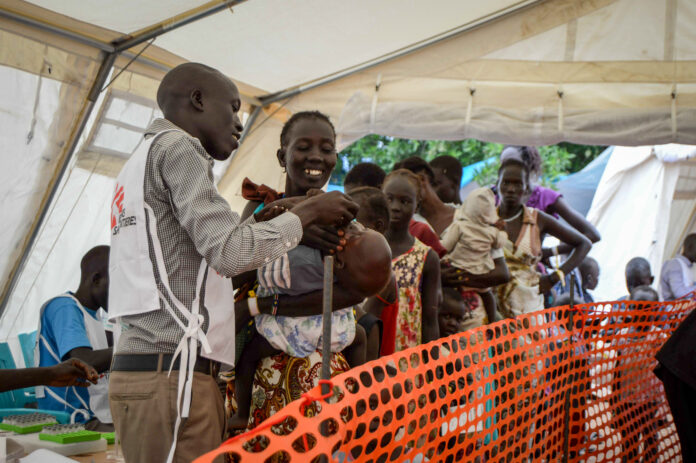Millions of children in conflict and crisis-affected regions are being denied access to routine vaccinations, exposing them to deadly but preventable diseases, warns Médecins Sans Frontières (MSF) in a new statement.
Drew L. Aiken, Medical Advocacy Advisor for MSF, describes the devastating consequences of this global health failure in a report titled “Vaccination in Conflict: A Lifeline Denied to Millions of Children.”
“In camps, hospitals, and frontline communities, we’re seeing children suffer and die from illnesses that should no longer claim lives—measles, diphtheria, polio, and meningitis,” said Aiken. “The systems are too slow and too detached from the urgency on the ground.”
According to MSF, global immunization rates have fallen sharply since the COVID-19 pandemic began in 2020. In 2023 alone, 14.5 million children missed their first routine vaccine dose, while another 21 million were under-immunized. The impact is especially stark in conflict zones, where health systems are already weak or collapsing.
In 2022, the Democratic Republic of the Congo recorded more than 300,000 measles cases and 6,000 deaths, while Gaza saw a polio outbreak. South Sudan reported over 12,700 measles cases and 239 deaths between late 2022 and March 2024.
MSF highlights South Sudan and Somalia as emblematic of the crisis. In South Sudan, a January 2024 measles outbreak in Yambio went unaddressed for four months due to vaccine supply delays and slow decision-making by key health actors. In Somalia’s Southwest State, a major vaccination campaign in Baidoa was scrapped in October 2023, despite plans to reach over 600,000 children—because vaccines never arrived.
“It’s not that we lack solutions—we know how to prevent these outbreaks. But political inaction, logistical challenges, and underfunding keep vaccines out of reach for the most vulnerable,” Aiken said.
MSF is calling for urgent reforms, including, Flexible funding mechanisms for emergencies in fragile states, Pre-approved outbreak response plans for rapid deployment, Expanded vaccination age range up to at least five years, Removal of bureaucratic barriers to vaccine delivery in conflict zones and tronger accountability for global and national health actors
Aiken concluded that the crisis is no longer about technical capability, but political will. “Until the world commits to timely, equitable vaccine access in all settings, history will continue to repeat itself—and children will pay the price.”





